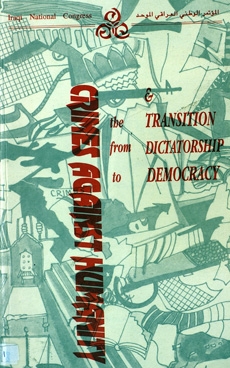 Crimes against humanity, the transition from dictatorship to democracy
Iraqi National Congress
Compte d’auteur
etween june 16 - 19, 1992, some two hundred Iraqis representing a broad political, ethnic and religious spectrum within Iraqi society met in Vienna to found the Iraqi National Congress (henceforth "the INC"). They came from all over the world-northern Iraq, neighboring countries like Iran and Syria, Europe and the USA. Over the course of four intensive days of heated discussion and debate, these Iraqis elected an 87-person "General Assembly" which in turn voted into existence an "Executive Committee" mandated to implement the decisions of the General Assembly.
At that founding conference, the General Assembly of the INC resolved to establish in Iraq a "constitutional, parliamentary, democratic order based upon political pluralism and the peaceful transfer of power through elections based upon the sovereignty of law."
The Vienna Congress also resolved that during the transition from dictatorship to democracy a transitional government must "work during a time period of not more than one year," to carry out a number of urgent tasks. Among these is "presenting those accused of crimes against the people before proper legal courts in which their right to self-defense is guaranteed." It went on to make the restriction that only the "higher decision makers and most responsible authorities in the existing regime" should be tried in this way.
.....
Contents
Preamble / 5
I. Accountability and Amnesty / 7
II. Violations of human rights in Iraq / 13
III. The legal grounds for the indictments / 45
IV. The proposed indictments / 63
V. The proposed tribunal and the principles behind its establishment / 109
VI. The draft charter of the international tribunal for Iraq / 119
Appendices
A. Samples of Iraqi Government documents / 133
B. Summary of Reports on human rights violations in Iraq / 171
C. Eyewitness Accounts from the International Press / 193
D. Audio - visual evidence of human rights violations / 207
E. Draft UN Security Council Resolution Establishing the International Tribunal / 213
PREAMBLE
Between june 16 - 19, 1992, some two hundred Iraqis representing a broad political, ethnic and religious spectrum within Iraqi society met in Vienna to found the Iraqi National Congress (henceforth "the INC"). They came from all over the world-northern Iraq, neighboring countries like Iran and Syria, Europe and the USA. Over the course of four intensive days of heated discussion and debate, these Iraqis elected an 87-person "General Assembly" which in turn voted into existence an "Executive Committee" mandated to implement the decisions of the General Assembly.
At that founding conference, the General Assembly of the INC resolved to establish in Iraq a "constitutional, parliamentary, democratic order based upon political pluralism and the peaceful transfer of power through elections based upon the sovereignty of law."
The Vienna Congress also resolved that during the transition from dictatorship to democracy a transitional government must "work during a time period of not more than one year," to carry out a number of urgent tasks. Among these is "presenting those accused of crimes against the people before proper legal courts in which their right to self-defense is guaranteed." It went on to make the restriction that only the "higher decision makers and most responsible authorities in the existing regime" should be tried in this way.
In a separate resolution, the General Assembly of the Vienna conference also voted into effect a resolution which called upon "the relevant international agencies to try Saddam Hussein and his associates." The INC also appealed to the international community, and the United Nations Security Council in particular, to begin establishing the process by which the trial could take place.
It was resolved to support in every way possible the European initiative then underway to bring die Iraqi regime before an international court for what the conference called the regime's "crimes against humanity." These resolutions, along with all other resolutions of the Vienna Congress, were once again ratified and re-adopted in Salahuddin, northern Iraq, on October 27-31, 1992, during the second conference of the General Assembly of the INC. At this conference, the INC had grown to embrace individual democrats and virtually all established organizations and currents within the Iraqi opposition. Of particular note in Salahuddin was the recommendation carried by the expanded General Assembly for the issuance of "a general pardon to all members of the Iraqi armed forces with the exception of the small leadership group around Saddam Hussein."
In the transition from dictatorship to democracy, the problem of justice looms very large. This report, entitled "Crimes Against Humanity and the Transition From Dictatorship To Democracy," has been prepared by the INC's Executive Council in fulfillment of all the previously mentioned resolutions and as a concrete elaboration of the forms that justice ought to take if the people of Iraq are going to be spared even more suffering than they have already endured.
Iraqi National Congress
Crimes against humanity,
the transition from dictatorship to democracy
Compte d’auteur
Crimes against humanity,
the from to transition from dictatorship to democracy
Report Issued by the executive council of the
Iraqi National Congress
Date of issue: May 25, 1993
Salahuldin, Iraq - London, UK
Salahuddin, Iraq
Tel: 873-1514503 - fax: 873-1514504
Trevor house, 100 Brompton road,
London, SW3 1ER, U.K.
Tel: 4471-5813205 - fax: 4471-5813218
Cover designed by: Dr. M. S. Rahim
Typesetting & Printing Zaid graffic,
Fax 071-720 8470, London, UK
|